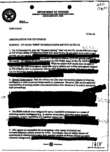Censorship in Nazi Germany
| Part of a series on | ||
| Censorship by country | ||
|---|---|---|
 | ||
| Countries | ||
|
|
||
| See also | ||
Censorship in Nazi Germany was extreme and strictly enforced by the governing Nazi Party, but specifically by Joseph Goebbels and his Reich Ministry of Public Enlightenment and Propaganda. The same body also produced and disseminated their own literature which were solely devoted to furthering nazi ideas and myths. Anti-semitism lay at the core of their works, and included films such as Jud Süß (1940 film) and The Eternal Jew (1940 film). The ministry promoted the cult of Adolf Hitler by sponsoring early films such as Triumph of the Will of the 1934 rally and The Victory of Faith made in 1933 (and which survives now as a single copy recently discovered in the UK. It was banned by the nazis owing to the prominent role of Ernst Roehm, who was murdered by Hitler on the Night of the Long Knives in 1934.
Media
The ministry tightly controlled information available to their citizens. Almost all Modernist art such Impressionism and Expressionism was considered degenerate art by the Nazi regime, and much modern music such as Jazz and Swing was also barred as degenerate music. Jewish composers like Mendelsohn and Schoenberg were also banned. Amongst those authors and artists who were suppressed both during the Nazi book burnings and the attempt to destroy modernist fine art in the "degenerate" art exhibition were:[1]
Artists such as
Composers such as
Philosophers, scientists and sociologists were suppressed by the Nazi Germany:
- Albert Einstein,
- Niels Bohr,
- Edmund Husserl,
- Karl Marx,
- Friedrich Engels,
- Friedrich Nietzsche,
- Sigmund Freud,
- Max Scheler[2]
Politicians suppressed by the Nazi Germany:
To avoid censorship of books they were often given an innocent looking cover, so called Tarnschriften.
See also
- Censorship in Germany
- Nazi propaganda
- Degenerate art
- Degenerate music
- List of authors banned in Nazi Germany
